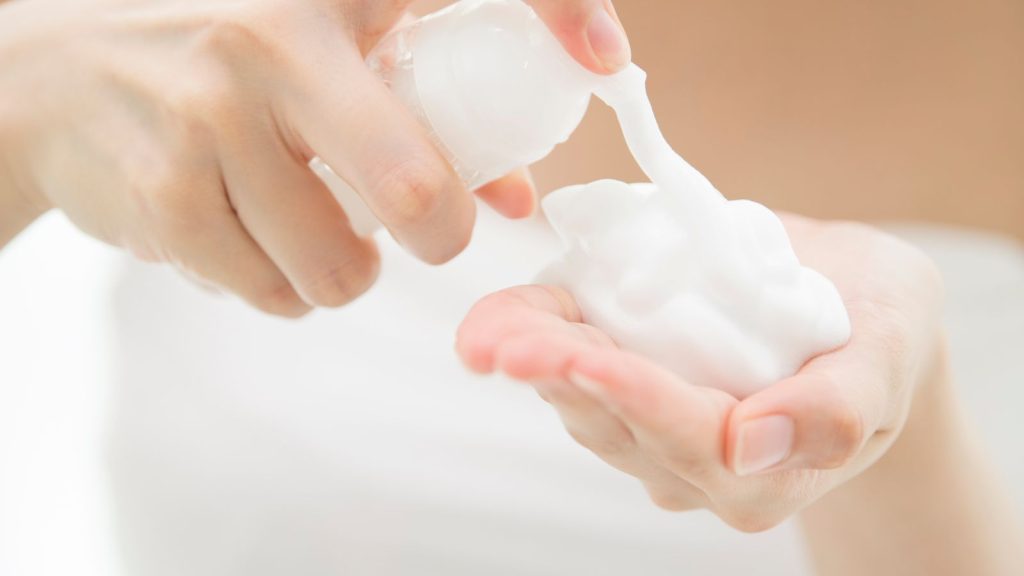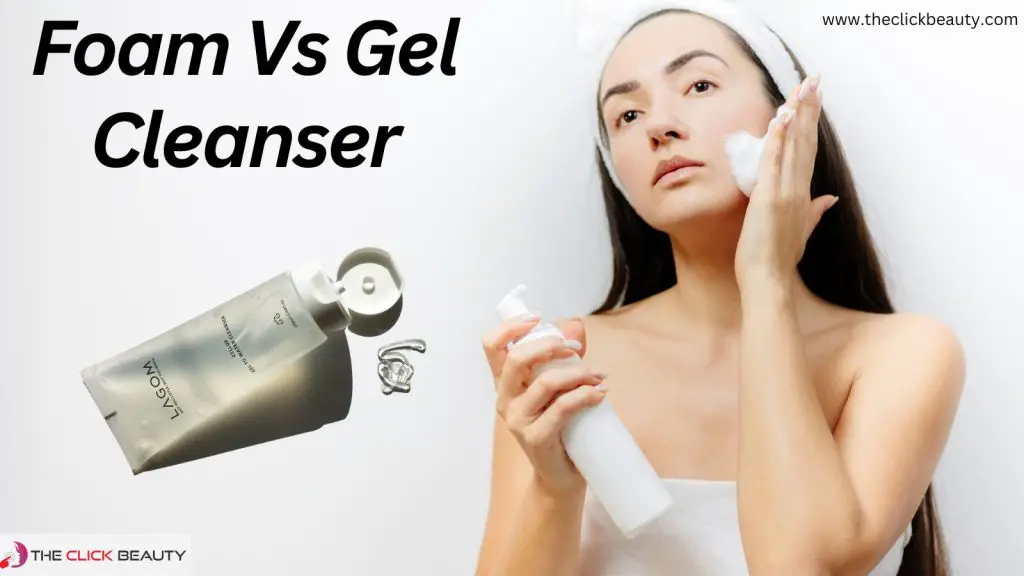Regarding skincare, numerous products are available for selection. But one of the most important choices is which cleanser you’ll use. Should you go for foam or gel?
Let’s explore the differences between foam and gel cleansers. It helps you make an informed decision about foam vs gel cleansers.
Foam cleansers
Foam cleansers are perfect for individuals with oily skin or those seeking a light and weightless product for their face. They’re also often gentle enough to be used daily without irritating the skin.
On the other hand, their ability to remove oil-based makeup could be enhanced, making it a less suitable option for heavy makeup wearers.
Gel cleansers
Gel cleansers, on the other hand, are heavier and thicker than foam cleansers. They’re great for people with dry skin because they provide extra moisture and hydration while effectively cleansing the face.
They can also remove oil-based makeup more effectively than foaming cleansers. However, some people find them too heavy for daily use, so if that’s the case with your skin type, you should opt for a lighter product such as a foam cleanser.
Benefits of Using Foam Cleanser

- The skin is effectively rid of dirt, oil, and makeup with the use of foam cleansers.
- All skin types, including sensitive skin, can use foam cleansers, which are gentle.
- Foam cleansers are non-comedogenic, preventing pore blockage.
- Foam cleansers can help to control excess oil production.
- Foam cleansers can help to reduce the appearance of pores.
- Foam cleansers can leave the skin feeling clean and refreshed.
- People who frequently wear makeup can benefit from using foam cleansers.
- Oily or combination skin benefits from foam cleansers.
- Sensitive-skin individuals find foam cleansers to be a suitable choice.
- People who prefer to steer clear of harsh chemicals on their skin can opt for foam cleansers.
Tips for Getting the Most Out of Your Cleanser
- Use a pea-sized amount of cleanser.
- Apply cleanser to dry skin.
- Massage the cleanser into your skin using circular motions.
- Rinse the cleanser with lukewarm water.
- Avoid hot water, as it can strip your skin’s natural oils.
- Use a soft towel to gently pat your skin dry after washing off the cleanser.
- Use a gentle cleanser that is designed for your skin type.
- If your skin is sensitive, opt for a scent-free, non-comedogenic cleaner.
- If you have oily skin, look for a cleanser that contains salicylic acid or benzoyl peroxide.
- To hydrate dry skin, opt for a creamy or milky cleanser.
- Utilize a cleansing brush or cloth to eliminate any dirt and impurities on your skin effectively.
- Follow up with a toner and moisturizer to help restore balance to your skin.
Is gel or foam cleanser better for acne?

In the battle of gel vs foam cleansers, knowing which is better for those dealing with aches can be challenging. Considering some important facts is necessary to make an informed decision.
Many people with acne prefer gel cleansers because they’re gentle and don’t remove moisture from the skin like most foam cleansers.
On the other hand, foam cleansers usually contain more potent active ingredients and are great at deep cleansing and removing impurities from the skin’s surface. Ultimately, the choice between both depends on individual needs and preferences.
What skin type is gel cleanser best for?
The gel cleanser suits individuals with oily to combination skin types excellently. This cleanser works by breaking down excess sebum and oil build-up on the skin’s surface, which can help reduce breakouts and dullness.
Gel cleansers also feel refreshing upon application and provide gentle exfoliation for keeping pores clean and reducing blackheads. This cleanser does not leave a heavy feeling after use, so it is ideal for those who want to avoid heaviness on their skin but still want adequate cleansing power.
Pros and Cons Of foam vs gel cleansers
Pros of Foam Cleanser:
- It’s gentle on the skin and rinses away easily without leaving any residue.
- Foam cleansers are suitable for all skin types, including sensitive skin.
- They deeply and thoroughly cleanse, simplifying the removal of dirt, sweat, and makeup from the face.r.
- Maintaining a healthy pH balance on the skin’s surface, foam cleansers can help keep breakouts at bay.
- Foam cleansers are often more affordable than other types.
Cons of Foam Cleanser:
- They can sometimes be too harsh for dry or sensitive skin, causing irritation and redness.
- Some foam cleansers contain sulfates known to strip natural oils away from the skin, leading to dryness and tightness in some cases.

Pros of Gel Cleansers:
- Gel cleansers are often gentle and suitable for sensitive skin.
- Typically, they are lightweight and can easily spread over the skin.
- Gel cleansers can help balance the pH levels in the skin.
- They have a cooling effect on the skin and can be incredibly refreshing after a workout or in hot weather.
- Gel cleansers don’t remove natural oils from the skin, leaving it hydrated and nourished.
Cons of Gel Cleansers:
- Other cleansers are more effective at removing makeup compared to gel cleansers.
- People with very dry or flaky skin may find that gel cleansers need to provide more hydration when used alone.
- Gel cleansers often contain fragrances or ingredients that can be bothersome for those with sensitive skin.
- It might be because they don’t lather up like another cleanser.
Both foam and gel cleansers have their benefits depending on your individual skin care needs! Foam cleansers are generally lighter and better suited for daily use by those with oily skin or who don’t wear much makeup.
Gel cleansers offer more hydration but can be too heavy for everyday use; however, they’re great for removing oil-based makeup more effectively than foam cleansers. In the end, it’s your call to determine the most suitable cleanser for your unique skin type!





